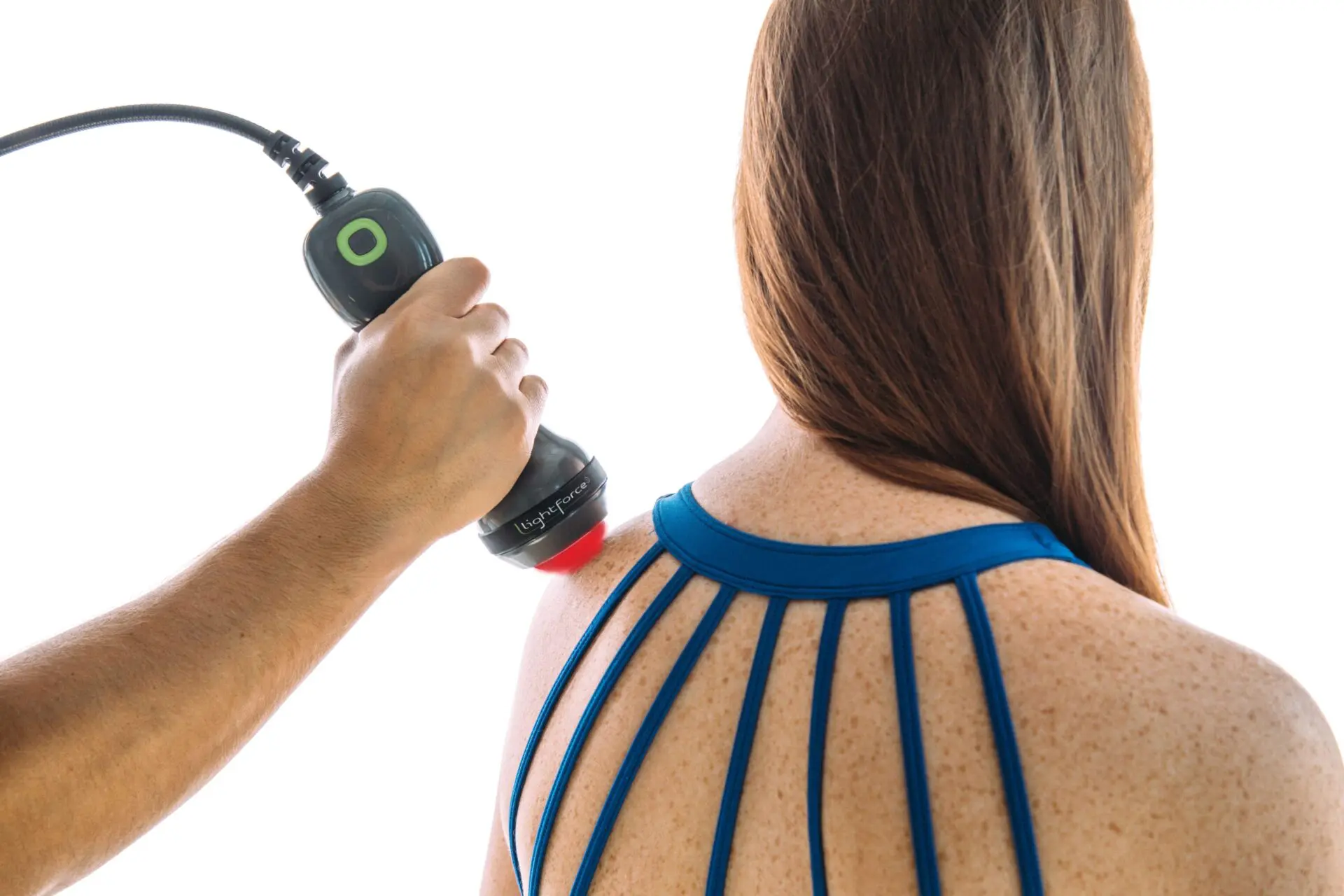Ever wish you had a magic wand to help treat injured tissue?
Explaining how therapeutic laser can accelerate a plan of care.
Contributed by Mark Callanen, PT, DPT, OCS
Director of Clinical Development, LightForce® Therapy Lasers
Progressing plans of care (POC) is a careful dance between identifying the current stage of healing, balancing subjective pain complaints, and appropriately increasing therapeutic activity levels. Incorporating high power laser to create temporary analgesic effects and spur on tissue healing via photobiomodulation (PBM) may make this task easier for clinicians.
Treating acute injuries usually focuses on controlling symptoms associated with pain and inflammation; which can include multiple techniques and modalities that will ultimately allow ROM and function to be restored later in the POC. This can be a trying time for athletes as their overall activity levels are reduced while their injury heals.
What If?
What if you could wave a magic wand over the injured area to reduce pain complaints (in minutes) and promote better ROM earlier in the POC? High power therapeutic lasers may be a modality that helps make this wish become a reality.
Laser therapy promotes photobiomodulation (PBM) which is the mechanism by which photons elicit photophysical and photochemical events in tissues leading to physiological changes and therapeutic effects(1).
Recent PBM research has shown that treating afferent nerves with higher power densities (irradiance) significantly impacts pain perception(2,3). When laser is applied in higher doses, it can slow down conduction rates and decrease the size of compound action potentials in both C and A delta afferent nerves(2,3). This can result in quick changes in patients’ pain complaints via true analgesia.
The Results
While getting quick pain relief is a desirable benefit when using high power laser, most clinicians want to achieve lasting results. The good news is that you don’t have to sacrifice one for the other. High power laser has the potential to help with both short term pain blocking and improved long-term function.
A 2018 study out of The University of Cairo looked at patients with rotator cuff tendinopathy that underwent exercise programs combined with either high intensity laser (HILT) or sham laser treatments, performed 3 x week for 4 weeks. The HILT group had significant improvements in pain, ROM, and Shoulder Pain and Disability Index (SPADI) scores compared to the sham group. Significant differences were still noted at 3 and 6 months(4).
Laser can be used for a variety of diagnoses. In 2017 The American College of Physicians endorsed Low Level Laser Therapy (LLLT) as the only passive modality in its treatment recommendations for chronic low back pain(5). The Journal of Orthopedic and Sports Physical Therapy (JOSPT) similarly recommended laser in its 2014 Clinical Practice Guidelines for the treatment of heel pain and plantar fasciitis(6) as well as its 2017 Revision of Neck Pain Treatment Guidelines, where it recommended laser in two subcategories(7).
Consistent Outcomes
Keys to getting consistent outcomes with any laser device is understanding how power, time, and wavelength impact dosing, while knowing the specifications of the device being used is imperative.
With correct dosing and adequate irradiance, PBM should open the door in the early phases of a POC to progress exercise programs and provide treatment options that would otherwise be delayed due to pain. This factor combined with the fact that PBM has been shown to help improve tissue healing through all phases of tissue healing, could result in athletes magically getting back on the field ahead of schedule.
Learn More >
References
1. Anders JJ, Lanzafame RJ, Arany PR. Low-level light/laser therapy versus photobiomodulation therapy. Photomed Laser Surg 2015;33:183–184.
2. Chow et al. Inhibitory Effects of Laser Irradiation on Peripheral Mammalian Nerves and Relevance to Analgesic Effects: A Systematic Review. Photomedicine and Laser Surgery Volume X, Number X, 2011ª Mary Ann Liebert, Inc. Pp. 1–17.
3. Holanda, V.M. et al. (2017) The Mechanistic Basis for Photobiomodulation Therapy of Neuropathic Pain by Near Infrared Laser Light. Lasers Surg Med. 2017 Jul;49(5):516-524.
4. Elsodany, A. et al. Long-Term Effect of Pulsed Nd:YAG Laser in the Treatment of Patients with Rotator Cuff Tendinopathy: A Randomized Controlled Trial. Photomedicine and Laser Surgery, Vol 36 (9), 2018, pp. 506–513.
5. Qaseem A, Wilt TJ, McLean RM, et al, for the Clinical Guidelines Committee of the American College of Physicians. Noninvasive Treatments for Acute, Subacute, and Chronic Low Back Pain: A Clinical Practice Guideline From the American College of Physicians. Ann Intern Med. 2017;166:514–530.
6. Martin, R, et al. Heel Pain—Plantar Fasciitis: Revision 2014 Clinical Practice Guidelines Linked to the International Classification of Functioning, Disability and Health From the Orthopaedic Section of the American Physical Therapy Association. J Orthop Sports Phys Ther. 2014;44(11): A1-A23.
7. Blanpied, P, et al. Neck Pain: Revision 2017 Clinical Practice Guidelines Linked to the International Classification of Functioning, Disability and Health From the Orthopaedic Section of the American Physical Therapy Association. J Orthop Sports Phys Ther. 2017;47(7): A1-A83.

Comments